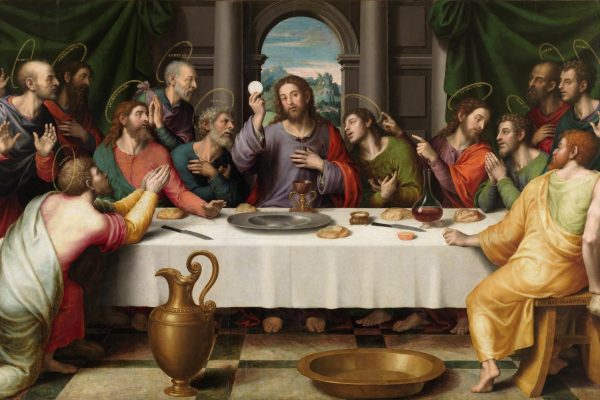Home>Bible Facts>Who Were Jesus Apostles


Bible Facts
Who Were Jesus Apostles
Published: February 18, 2024
Ericka Andersen, an editor at Christian.net, expertly merges digital strategy with content creation, focusing on faith and societal issues. Her communication skills enhance the platform's engaging narratives, fostering meaningful dialogue on belief's impact on society.
Discover fascinating Bible facts about Jesus' apostles and their significant roles in spreading his teachings. Learn about the lives and contributions of these influential figures. Explore more with our comprehensive guide.
(Many of the links in this article redirect to a specific reviewed product. Your purchase of these products through affiliate links helps to generate commission for Christian.net, at no extra cost. Learn more)
Table of Contents
Introduction
The apostles of Jesus Christ were a remarkable group of individuals who played a pivotal role in the establishment and spread of Christianity. Chosen by Jesus himself, these twelve men were witnesses to his teachings, miracles, crucifixion, and resurrection. Their unwavering dedication and commitment to sharing the gospel laid the foundation for the Christian faith that continues to inspire and guide millions of people worldwide.
The word "apostle" originates from the Greek word "apostolos," which means "one who is sent out." In the context of Christianity, an apostle is a person who is chosen and commissioned to spread the teachings of Jesus Christ. The twelve apostles were handpicked by Jesus during his earthly ministry, and they became his closest companions and followers.
Each apostle had a unique background and set of experiences that contributed to the diverse tapestry of the group. Their individual stories and encounters with Jesus offer valuable insights into the transformative power of faith and the profound impact of encountering the divine.
As we delve into the lives of these extraordinary individuals, we will uncover the depth of their devotion, the challenges they faced, and the enduring legacy they left behind. Through their journeys, we gain a deeper understanding of the profound influence of Jesus Christ and the timeless relevance of his message of love, compassion, and redemption.
The lives of the apostles serve as a testament to the enduring power of faith and the transformative impact of encountering the teachings of Jesus. Their unwavering commitment to spreading the gospel amidst adversity and persecution exemplifies the resilience and strength that can be found in a steadfast belief in the divine.
In the subsequent sections, we will embark on a captivating exploration of each apostle's life, delving into their unique contributions, personal encounters with Jesus, and the enduring impact they had on the early Christian community and beyond. Join us on this enlightening journey as we unravel the captivating narratives of the apostles of Jesus Christ.
Read more: Who Were All Of Jesus Apostles
Simon Peter
Simon Peter, originally known as Simon, was a fisherman by trade and hailed from the town of Bethsaida. He was the son of Jonah and the brother of Andrew, another of Jesus' apostles. Peter's given name was Simon, but Jesus bestowed upon him the name "Peter," which means "rock" in Greek, signifying the steadfastness and resilience that would come to define his character.
Peter's journey with Jesus was marked by profound moments of faith, courage, and human fallibility. He was among the first disciples called by Jesus and quickly emerged as a prominent figure among the apostles. His impulsive nature and unwavering devotion to Jesus set him apart as a passionate and outspoken disciple.
One of the most iconic events in Peter's life was his bold act of walking on water to meet Jesus during a storm on the Sea of Galilee. Despite initially displaying fear and doubt, Peter's faith enabled him to step out of the boat and experience the miraculous power of Christ firsthand.
Peter's unwavering loyalty to Jesus was evident in his declaration of faith at Caesarea Philippi, where he proclaimed, "You are the Messiah, the Son of the living God." This profound confession solidified Peter's pivotal role in the early Christian movement and highlighted his deep understanding of Jesus' divine identity.
However, Peter also experienced moments of weakness and doubt, most notably when he denied Jesus three times during the events leading up to the crucifixion. Despite this lapse, Peter's profound remorse and subsequent restoration by Jesus exemplify the transformative nature of forgiveness and grace.
After Jesus' resurrection, Peter played a central role in the early church, boldly proclaiming the gospel and demonstrating unwavering courage in the face of persecution. His leadership and resilience were instrumental in the spread of Christianity, particularly among the Jewish community.
Peter's enduring legacy is a testament to the transformative power of faith and the profound impact of encountering the teachings of Jesus. His journey from a humble fisherman to a foundational figure in the Christian faith serves as an inspiring example of human frailty, divine grace, and unwavering commitment to the gospel.
As we reflect on the life of Simon Peter, we are reminded of the complexities of human nature and the transformative power of faith. His story serves as a timeless testament to the enduring impact of encountering the teachings of Jesus and the profound influence of unwavering devotion in the face of adversity.
Andrew
Andrew, the brother of Simon Peter, was also a fisherman from the town of Bethsaida. He was among the first disciples called by Jesus and played a significant role in the early Christian community. Andrew's humility and steadfast dedication to Jesus set a powerful example for believers throughout history.
One of the most notable accounts of Andrew's life is his pivotal role in bringing others to Jesus. After becoming a disciple of Jesus, Andrew immediately sought out his brother, Simon Peter, and introduced him to the Messiah, declaring, "We have found the Messiah." This act of evangelism underscores Andrew's deep conviction and his eagerness to share the transformative message of Jesus with those closest to him.
Andrew's selfless and inclusive nature is further exemplified in the Gospel of John, where he is involved in the miraculous feeding of the five thousand. When a young boy offered his meager lunch of five barley loaves and two fish, it was Andrew who brought him to Jesus, demonstrating a profound willingness to involve others in the work of the ministry and to contribute what little they had for the greater good.
Throughout his time as an apostle, Andrew displayed unwavering faith and a willingness to serve. His humility and dedication to spreading the gospel laid a foundation for the early Christian church and set an enduring example for future generations of believers.
Andrew's ultimate sacrifice for his faith further solidifies his legacy. According to early Christian tradition, Andrew met his martyrdom in the city of Patras, Greece, where he was crucified on an X-shaped cross. Despite facing persecution and death, Andrew remained resolute in his commitment to Jesus, leaving behind a profound legacy of courage and devotion.
The life of Andrew serves as a compelling reminder of the transformative power of faith and the profound impact of selfless dedication to the teachings of Jesus. His unwavering commitment to sharing the gospel and his willingness to sacrifice for his beliefs continue to inspire and resonate with believers around the world.
As we reflect on the life of Andrew, we are reminded of the enduring influence of individuals who wholeheartedly dedicate themselves to the cause of Christ. His example challenges us to embrace humility, share the message of hope, and remain steadfast in our faith, even in the face of adversity.
James, son of Zebedee
James, the son of Zebedee, was one of the twelve apostles chosen by Jesus Christ. Alongside his brother John, he was part of the inner circle of disciples who shared intimate moments with Jesus, such as the Transfiguration and the agony in the Garden of Gethsemane. James and John were known as the "Sons of Thunder," a testament to their fervent and zealous nature.
James, a fisherman by trade, was called by Jesus to leave behind his livelihood and follow him. This act of obedience and sacrifice marked the beginning of a transformative journey that would shape the course of his life and legacy. As a close companion of Jesus, James witnessed firsthand the profound teachings, miracles, and sacrificial love of the Messiah.
One of the most significant events in James' life was his presence during the Transfiguration, where he, along with Peter and John, beheld the radiant glory of Jesus. This awe-inspiring experience solidified James' understanding of Jesus' divine nature and further strengthened his commitment to the teachings of the Messiah.
Despite his fervent devotion, James, like the other apostles, grappled with moments of human frailty and misunderstanding. In the Gospel accounts, James and John displayed a degree of ambition when they requested positions of honor and authority in the kingdom of God. However, Jesus gently redirected their aspirations, emphasizing the servant-hearted nature of true discipleship.
James' unwavering faith and dedication to Jesus were evident in his willingness to endure persecution and hardship for the sake of the gospel. His ultimate sacrifice for his faith is recorded in the book of Acts, where he became the first apostle to be martyred for his beliefs. James' steadfast commitment to Jesus, even in the face of persecution, serves as a powerful example of courage and resilience for believers throughout history.
The life of James, son of Zebedee, offers profound insights into the transformative power of encountering Jesus Christ. His journey from a humble fisherman to a devoted apostle underscores the enduring impact of faith and the profound influence of encountering the teachings of the Messiah. James' legacy continues to inspire and challenge believers to embrace unwavering commitment to the gospel and to stand firm in the face of adversity.
As we reflect on the life of James, we are reminded of the enduring influence of individuals who wholeheartedly dedicate themselves to the cause of Christ. His example challenges us to embrace humility, share the message of hope, and remain steadfast in our faith, even in the face of adversity.
John
John, the son of Zebedee and the brother of James, was a prominent figure among the twelve apostles chosen by Jesus Christ. His close relationship with Jesus and his profound contributions to the early Christian community have left an indelible mark on the history of Christianity.
As a fisherman by trade, John, along with his brother James, was called by Jesus to leave behind their livelihood and follow him. This pivotal moment marked the beginning of a transformative journey that would shape the course of John's life and legacy. John's deep commitment to Jesus and his unwavering faith were evident throughout his time as an apostle.
One of the most significant aspects of John's life was his close bond with Jesus, often referred to as the "disciple whom Jesus loved." This intimate relationship granted John unique insights into the teachings and character of Jesus. He was present at pivotal moments in Jesus' ministry, including the Transfiguration and the agony in the Garden of Gethsemane, where he witnessed the profound humanity and divinity of the Messiah.
John's profound understanding of Jesus' teachings is evident in his writings, particularly in the Gospel of John and the epistles bearing his name. His Gospel provides a distinct perspective on the life and ministry of Jesus, emphasizing his divine nature and the transformative power of faith. Through his writings, John conveyed the timeless message of love, redemption, and the eternal significance of encountering Jesus Christ.
Following Jesus' crucifixion and resurrection, John played a central role in the early Christian community. His leadership and unwavering commitment to spreading the gospel were instrumental in the establishment and growth of the early church. John's enduring legacy as a prolific writer and influential apostle continues to inspire and guide believers across generations.
John's profound impact extended beyond his role as an apostle. According to Christian tradition, he was exiled to the island of Patmos, where he received the visions recorded in the Book of Revelation. These apocalyptic visions offer a glimpse into the divine plan for the future and serve as a source of hope and encouragement for believers facing adversity.
The life of John, son of Zebedee, offers profound insights into the transformative power of encountering Jesus Christ. His unwavering commitment to the gospel and his profound understanding of Jesus' teachings continue to resonate with believers, inspiring them to embrace the message of love, grace, and eternal truth.
As we reflect on the life of John, we are reminded of the enduring influence of individuals who wholeheartedly dedicate themselves to the cause of Christ. His example challenges us to embrace humility, share the message of hope, and remain steadfast in our faith, even in the face of adversity.
Read more: Who Were The Super Apostles
Philip
Philip, one of the twelve apostles chosen by Jesus Christ, played a significant role in the early Christian community. His journey as a disciple of Jesus was marked by moments of profound faith, inquiry, and dedicated service. As a native of Bethsaida, Philip was called by Jesus to follow him, leaving behind his previous life to embark on a transformative path of discipleship.
One of the most notable accounts of Philip's interactions with Jesus is found in the Gospel of John, where he was approached by Jesus with a question about feeding the multitude. In this pivotal moment, Philip's response reflected a practical and pragmatic mindset, as he assessed the enormity of the task in relation to the available resources. This interaction provides valuable insights into Philip's thought process and his initial struggle to grasp the miraculous power of Jesus.
Philip's deep desire to understand and experience the divine is further exemplified in the Gospel of John, where he approached Jesus with a request: "Lord, show us the Father, and it is enough for us." Jesus' response to Philip's plea underscores the profound nature of encountering the divine and the transformative impact of faith. This exchange highlights Philip's earnest quest for spiritual truth and his longing to behold the divine presence.
Following Jesus' resurrection and the outpouring of the Holy Spirit, Philip played a pivotal role in spreading the gospel and advancing the early Christian movement. His unwavering commitment to sharing the message of Jesus Christ led him to engage with diverse communities, including the Samaritans and an Ethiopian eunuch, demonstrating a spirit of inclusivity and a fervent dedication to the Great Commission.
According to early Christian tradition, Philip's missionary efforts extended to various regions, including Phrygia and Hierapolis, where he continued to proclaim the transformative message of Jesus Christ. His boldness and resilience in the face of adversity serve as a testament to the enduring impact of encountering the teachings of Jesus and the unwavering commitment to the gospel.
The life of Philip, son of Zebedee, offers profound insights into the transformative power of encountering Jesus Christ. His journey from a pragmatic disciple to a fervent evangelist underscores the enduring impact of faith and the profound influence of encountering the teachings of the Messiah. Philip's legacy continues to inspire and challenge believers to embrace unwavering commitment to the gospel and to share the message of hope with boldness and conviction.
Bartholomew
Bartholomew, also known as Nathanael, was one of the twelve apostles chosen by Jesus Christ. His inclusion among the select group of disciples underscores the diverse backgrounds and unique contributions of the individuals called to follow Jesus. While the Gospel accounts provide relatively limited information about Bartholomew, his presence among the apostles signifies his integral role in the early Christian community.
The name Bartholomew is often linked with Nathanael, a figure mentioned in the Gospel of John. According to the narrative, Philip, another apostle, introduced Nathanael to Jesus, proclaiming, "We have found him of whom Moses in the Law and also the prophets wrote, Jesus of Nazareth, the son of Joseph." Nathanael initially expressed skepticism, questioning whether anything good could come from Nazareth. However, upon encountering Jesus, he was astounded by the Messiah's supernatural knowledge, leading him to declare, "Rabbi, you are the Son of God! You are the King of Israel."
Bartholomew's encounter with Jesus exemplifies the transformative power of personal revelation and the profound impact of encountering the divine. His journey from skepticism to profound faith serves as a testament to the enduring influence of Jesus' teachings and the compelling nature of his divine identity.
While the specific details of Bartholomew's ministry and subsequent endeavors are not extensively documented in the New Testament, early Christian traditions and historical accounts suggest that he played a significant role in advancing the gospel beyond the confines of the immediate discipleship circle. According to tradition, Bartholomew engaged in missionary activities, proclaiming the message of Jesus Christ in various regions, including Armenia and India. His unwavering commitment to sharing the transformative message of the gospel underscores the enduring impact of encountering Jesus and the profound influence of faith in action.
Bartholomew's legacy as an apostle continues to inspire and challenge believers to embrace the transformative power of encountering Jesus Christ. His journey from skepticism to fervent faith serves as a timeless example of the profound impact of personal revelation and the enduring influence of encountering the teachings of the Messiah. Bartholomew's life exemplifies the transformative power of faith and the enduring impact of unwavering commitment to the gospel, leaving an indelible mark on the history of Christianity.
Thomas
Thomas, often referred to as "Doubting Thomas," was one of the twelve apostles chosen by Jesus Christ. His journey as a disciple is characterized by moments of skepticism, profound revelation, and unwavering faith. Thomas' inclusion among the select group of apostles underscores the diverse range of personalities and experiences within the inner circle of Jesus' followers.
One of the most iconic accounts involving Thomas is his initial skepticism regarding Jesus' resurrection. Following the crucifixion, when the other disciples shared the news of encountering the risen Christ, Thomas expressed doubt, stating that he would only believe if he could physically touch the wounds of Jesus. This moment of doubt has earned him the moniker "Doubting Thomas," a label that has become synonymous with skepticism and the need for tangible evidence.
However, Thomas' journey from doubt to profound faith is a testament to the transformative power of encountering the resurrected Jesus. According to the Gospel of John, Jesus appeared to the disciples, including Thomas, and invited him to touch his wounds, leading Thomas to declare, "My Lord and my God!" This pivotal moment marked a profound shift in Thomas' perception, as he moved from skepticism to a resolute confession of faith in the divine identity of Jesus.
Thomas' transformation serves as a powerful example of the enduring impact of encountering the resurrected Christ and the profound influence of personal revelation. His journey from doubt to unwavering faith underscores the transformative power of encountering the teachings of Jesus and the profound impact of experiencing the divine presence.
Following this transformative encounter, Thomas played a significant role in the early Christian community, demonstrating unwavering commitment to spreading the gospel. According to tradition, Thomas engaged in missionary activities, proclaiming the message of Jesus Christ in diverse regions, including India. His boldness and resilience in the face of adversity serve as a testament to the enduring impact of encountering the teachings of Jesus and the unwavering commitment to the gospel.
Thomas' legacy as an apostle continues to inspire and challenge believers to embrace the transformative power of encountering Jesus Christ. His journey from doubt to fervent faith serves as a timeless example of the profound impact of personal revelation and the enduring influence of encountering the teachings of the Messiah. Thomas' life exemplifies the transformative power of faith and the enduring impact of unwavering commitment to the gospel, leaving an indelible mark on the history of Christianity.
Matthew
Matthew, also known as Levi, was a tax collector before being called by Jesus to become one of the twelve apostles. His inclusion among the select group of disciples signifies the transformative power of encountering Jesus Christ and the profound impact of embracing a new identity and purpose.
As a tax collector, Matthew was likely viewed with disdain and suspicion by his fellow Jews, as tax collectors were often associated with corruption and collaboration with the oppressive Roman authorities. However, Jesus saw beyond Matthew's societal label and recognized his potential for discipleship. When Jesus extended the invitation, "Follow me," Matthew responded with unwavering obedience, leaving behind his former life to embark on a transformative journey of faith and service.
Matthew's Gospel, written by the apostle himself, provides a unique perspective on the life and teachings of Jesus. His meticulous attention to detail and emphasis on the fulfillment of Old Testament prophecies underscore the profound significance of Jesus' identity as the long-awaited Messiah. Through his Gospel, Matthew conveys the timeless message of redemption, forgiveness, and the inclusive nature of Jesus' ministry, particularly in his interactions with marginalized individuals and outcasts.
Following Jesus' resurrection and the outpouring of the Holy Spirit, Matthew played a pivotal role in spreading the gospel and advancing the early Christian movement. His commitment to sharing the transformative message of Jesus Christ extended beyond the confines of his immediate circle, as he engaged in missionary activities to proclaim the good news to diverse communities.
According to early Christian tradition, Matthew's missionary endeavors took him to distant lands, including Ethiopia and Persia, where he fearlessly proclaimed the message of salvation. His unwavering dedication to the gospel and his willingness to embrace a new identity as a follower of Jesus serve as a testament to the transformative power of encountering the teachings of the Messiah.
Matthew's legacy as an apostle continues to inspire and challenge believers to embrace the transformative power of encountering Jesus Christ. His journey from a tax collector to a fervent evangelist underscores the enduring impact of faith and the profound influence of embracing a new identity and purpose in Christ. Matthew's life exemplifies the transformative power of faith and the enduring impact of unwavering commitment to the gospel, leaving an indelible mark on the history of Christianity.
Read more: Who Were The Successors Of The Apostles
James, son of Alphaeus
James, son of Alphaeus, was one of the twelve apostles chosen by Jesus Christ, yet his presence in the Gospel accounts is relatively understated compared to some of his fellow disciples. Despite the limited information available about his specific actions and contributions, James' inclusion among the select group of apostles underscores the diverse backgrounds and unique roles within the early Christian community.
As one of the lesser-known apostles, James, son of Alphaeus, exemplifies the humility and quiet dedication that characterized many of Jesus' followers. While his individual actions may not be extensively documented, his steadfast commitment to the teachings of Jesus and the spread of the gospel undoubtedly played a significant role in the early Christian movement.
James' journey as an apostle likely involved moments of profound revelation, personal transformation, and unwavering faith. His decision to leave behind his previous life and follow Jesus signified a pivotal turning point, marking the beginning of a transformative journey that would shape the course of his life and legacy.
The collective experiences of the apostles, including James, son of Alphaeus, offer valuable insights into the diverse tapestry of personalities and backgrounds within the inner circle of Jesus' followers. Their unwavering commitment to spreading the message of Jesus Christ, despite facing adversity and persecution, underscores the enduring impact of encountering the teachings of the Messiah.
While the specific details of James' ministry and subsequent endeavors may not be extensively documented, his presence among the apostles serves as a testament to the profound influence of faith and the enduring impact of encountering Jesus Christ. His quiet dedication and unwavering commitment to the gospel contributed to the establishment and growth of the early Christian community, leaving an indelible mark on the history of Christianity.
In the collective narrative of the apostles, James, son of Alphaeus, represents the often overlooked yet essential role played by individuals who wholeheartedly dedicated themselves to the cause of Christ. His inclusion among the select group of apostles serves as a timeless reminder of the diverse and multifaceted nature of discipleship, inspiring believers to embrace humility, dedication, and unwavering commitment to the transformative message of Jesus Christ.
Thaddaeus
Thaddaeus, also known as Lebbaeus or Judas, was one of the twelve apostles chosen by Jesus Christ. Despite the relatively limited mention of his name in the Gospel accounts, Thaddaeus played a significant role in the early Christian community, contributing to the spread of the gospel and the establishment of the Christian faith.
As one of the lesser-known apostles, Thaddaeus exemplifies the humility and steadfast dedication that characterized many of Jesus' followers. His commitment to the teachings of Jesus and the advancement of the gospel likely involved moments of profound revelation, personal transformation, and unwavering faith. Like his fellow apostles, Thaddaeus made the pivotal decision to leave behind his previous life and follow Jesus, marking the beginning of a transformative journey that would shape the course of his life and legacy.
Thaddaeus' presence among the apostles signifies the diverse backgrounds and unique roles within the inner circle of Jesus' followers. While specific details of his individual actions may not be extensively documented, his collective contributions, alongside those of his fellow apostles, were instrumental in the early Christian movement. Their unwavering commitment to spreading the message of Jesus Christ, despite facing adversity and persecution, underscores the enduring impact of encountering the teachings of the Messiah.
According to early Christian tradition, Thaddaeus engaged in missionary activities, fearlessly proclaiming the transformative message of the gospel to diverse communities. His willingness to embrace the challenges of spreading the gospel beyond the immediate discipleship circle serves as a testament to the enduring influence of faith and the profound impact of unwavering commitment to the teachings of Jesus Christ.
In the collective narrative of the apostles, Thaddaeus represents the often overlooked yet essential role played by individuals who wholeheartedly dedicated themselves to the cause of Christ. His inclusion among the select group of apostles serves as a timeless reminder of the diverse and multifaceted nature of discipleship, inspiring believers to embrace humility, dedication, and unwavering commitment to the transformative message of Jesus Christ.
Thaddaeus' legacy as an apostle continues to inspire and challenge believers to embrace the transformative power of encountering Jesus Christ. His quiet dedication and unwavering commitment to the gospel contributed to the establishment and growth of the early Christian community, leaving an indelible mark on the history of Christianity.
Simon the Zealot
Simon the Zealot, also known as Simon the Cananaean, was one of the twelve apostles chosen by Jesus Christ. His inclusion among the select group of disciples underscores the diverse backgrounds and unique contributions of the individuals called to follow Jesus. The title "Zealot" is believed to signify Simon's association with the Zealot movement, a Jewish sect known for its fervent commitment to the Mosaic law and opposition to Roman rule. This affiliation sheds light on Simon's passionate and zealous nature, reflecting his deep convictions and dedication to his beliefs.
As a Zealot, Simon likely held strong nationalist sentiments and a fervent desire for the liberation of the Jewish people from Roman oppression. His background as a member of this movement adds a layer of complexity to the composition of the apostolic group, showcasing the diverse range of perspectives and experiences within the inner circle of Jesus' followers.
Simon's decision to leave behind his previous life and follow Jesus marked the beginning of a transformative journey that would shape the course of his life and legacy. His unwavering commitment to the teachings of Jesus and the spread of the gospel likely involved moments of profound revelation, personal transformation, and unwavering faith. Despite potential ideological differences with other members of the apostolic group, Simon's collective contributions, alongside those of his fellow apostles, were instrumental in the early Christian movement.
While specific details of Simon's individual actions may not be extensively documented in the Gospel accounts, his presence among the apostles signifies the diverse backgrounds and unique roles within the early Christian community. His unwavering commitment to spreading the message of Jesus Christ, despite facing adversity and persecution, underscores the enduring impact of encountering the teachings of the Messiah.
According to early Christian tradition, Simon engaged in missionary activities, fearlessly proclaiming the transformative message of the gospel to diverse communities. His willingness to embrace the challenges of spreading the gospel beyond the immediate discipleship circle serves as a testament to the enduring influence of faith and the profound impact of unwavering commitment to the teachings of Jesus Christ.
In the collective narrative of the apostles, Simon the Zealot represents the multifaceted nature of discipleship and the diverse backgrounds that contributed to the early Christian movement. His inclusion among the select group of apostles serves as a timeless reminder of the transformative power of encountering Jesus Christ and the enduring influence of unwavering commitment to the gospel. Simon's life exemplifies the transformative power of faith and the enduring impact of embracing a new identity and purpose in Christ, leaving an indelible mark on the history of Christianity.
Judas Iscariot
Judas Iscariot, one of the twelve apostles chosen by Jesus Christ, is a figure shrouded in infamy and tragedy. His name has become synonymous with betrayal, serving as a cautionary tale of the devastating consequences of greed and deception. Judas' pivotal role in the events leading to Jesus' crucifixion has sparked centuries of contemplation and debate, prompting profound questions about human nature, divine foreknowledge, and the complexities of free will.
The Gospel accounts depict Judas as the treasurer among the apostles, entrusted with managing the group's finances. Despite being a close companion of Jesus and a witness to his teachings and miracles, Judas' heart became increasingly consumed by greed and disillusionment. The Gospel of John portrays Judas as a thief who pilfered from the common purse, foreshadowing the tragic trajectory of his actions.
The defining moment of Judas' legacy is his betrayal of Jesus, a harrowing act that unfolded in the Garden of Gethsemane. Guided by his own motives and influenced by external forces, Judas infamously identified Jesus to the authorities with a kiss, setting in motion the events that led to the crucifixion of the Messiah. The thirty pieces of silver, a paltry sum for the priceless act of betrayal, epitomize the tragic consequences of Judas' actions.
The motivations behind Judas' betrayal have been the subject of intense scrutiny and speculation. Some interpretations suggest that Judas' actions were driven by disillusionment with Jesus' perceived failure to establish an earthly kingdom, while others point to the influence of external forces and the fulfillment of divine prophecy. Regardless of the underlying reasons, Judas' betrayal stands as a sobering reminder of the fragility of human resolve and the profound impact of moral choices.
The aftermath of Judas' betrayal culminated in profound remorse and tragedy. Overwhelmed by guilt and the weight of his actions, Judas sought to return the blood money and ultimately met a tragic end, succumbing to despair and taking his own life. His fate serves as a haunting reminder of the devastating consequences of betrayal and the enduring impact of moral choices.
Judas Iscariot's legacy continues to provoke contemplation and introspection, prompting individuals to confront the complexities of human nature and the enduring influence of moral decisions. His story serves as a cautionary tale, challenging individuals to examine their motives, confront the allure of greed, and consider the profound implications of their actions. In the collective narrative of the apostles, Judas Iscariot stands as a tragic figure, prompting reflection on the complexities of human nature and the enduring impact of moral choices.













